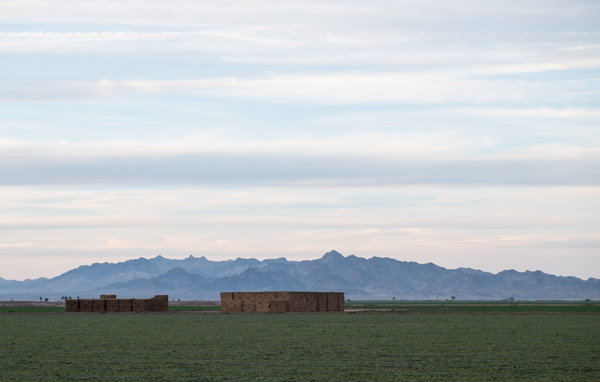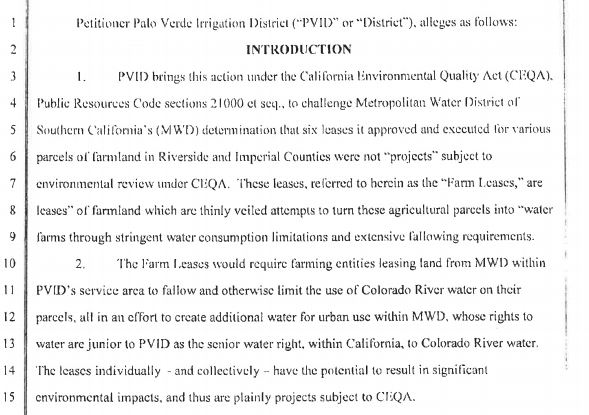
Palo Verde Irrigation District alfalfa, Blythe Calif., February 2015, photo copyright John Fleck
One of California’s largest Colorado River farm water districts is suing the state’s largest municipal water agency, charging that efforts to move farm water to cities are threatening the viability of agriculture in one of the oldest farming valleys on the river.
The Palo Verde Irrigation District, in a suit filed last month in Riverside County Superior Court, is charging the Metropolitan Water District of Southern California with “thinly veiled attempts” to turn agricultural land it owns in the Blythe Valley into “water farms” by placing water consumption limits and fallowing requirements on the land in order that water from the parcels could be moved to use in Southern California’s coastal cities.
Sorry, I only have a scan of a fax, but here’s PVID’s opening gambit:

PVID v. MWD
(For those interested in following along at home, it’s Case No. RIC1714672 in Riverside County Superior Court.)
Met and PVID have a long and cordial relationship, with one of the pioneering ag-urban transfer agreements that compensates farmers for fallowing land in dry years to move water to cities. But the relationship has been complicated in recent years by Met’s decision to buy up some 22,000 acres of land in the district. The lawsuit is a first salvo in what’s shaping up as a conflict over whether, if water use is reduced on the land Met owns, that saved water can be then shipped via the Colorado River Aqueduct to coastal Southern California cities.
In its suit, PVID argues that there’s what we economics faculty would call “an externality” that must be considered under California’s environmental review statutes:

PVID v. MWD
To be clear, Met has repeatedly insisted that it is not going to dry up the Palo Verde Valley. As Tony Perry put it in the LA Times two years ago:
Their message: No harm will come to the agricultural economy of the Palo Verde Valley. MWD plans to abide by the 2005 agreement, which caps at 35% (26,000 acres) the amount of the valley’s farmland being fallowed. More than 25,000 acres are fallowed currently.
Randy Record, the MWD board chairman, said he wants to reassure farmers and others in Palo Verde that the local economy will not be hurt.
“I’m a farmer myself,” Record said. “For me, the [fallowing] program is not a success unless it benefits both parties.”
But for what it’s worth, now they’re all in court.
This implicates deep questions in these ag-urban water transfers – should preserving agricultural communities be a policy goal, and if so how to achieve it?
This is a conflict that will be closely watched across the West, because if rather than negotiating complex water transfer deals with ag agencies cities can simply buy up farm land and take the water, the policy landscape (and the underlying real landscape, shaped by those policies) becomes a very different thing.

It appears that in infancy MWD was to maintain a minority interest, It would be tough for an irrigation district to function if outside interests control 51% or more.
Mr: Farmer ! I recommend you cover your Ass; And also your assets: M/W operating with big Bond $$ money: & pays no property Tax: Guess What? Desalination of the Ocean is the key: Cost $50- $80 dollars more,per home each month: Move to Texas: Food & Water is our life blood:
Reminds me of the good old boys in the classic movie “Chinatown”.True Story.
It’s in cases like this that future growth. and development in Blythe depends. All residents should monitor the results carefully.
Why should a city even be able to buy land outside its Urban Growth area in the first place? Its a government entity with no real motive other than extension of its power!
There are far too many issues associated with cities large population numbers and bondable situations to allow this.
California is lost to America, its is becoming a real world socialist state.
MWD& Los Angeles water districts have a long history of drying up farm areas. Just ask the fokes in the Owens valley about drying up farm land??? I think Randy’s comments about being a farmer himself is worth about the same value as Malholands comments in ( Cadillac desert) in the 1920’s when thay where buying up farm ground in the Owens valley. MWD is a 10,000lbs gorilla in western water and thay think thay are untouchable . Hope the court system will work and save this valuable farm ground from going back to dessert. We all might need to eat someday food grow in the good old USA not South America!!!!!
I see another Mulholland (LA water grab) happening all over again. Traveling along highway 10 in Blythe the once beautiful citrus grove is now replaced by a drab palm tree farm, soon all there will be is brown in what was once a cluster of green farms that actually feed the US. MWD only wants to line their pockets with money from the water that once belonged to the farmers. Good Luck PVWD in your suit, get back what belongs to you.
Chickens are coming home to roost. One acre one vote with AB1156. We diluted and excluded the vote of the majority of the valley’s residents. PVID needs to use strategy and planning, and include the non-agricultural residents as valuable allies in dealing with the Goliath- the MWD.
Pingback: California Water News for September 7, 2017
when you lay down with dogs , you wake up with fleas
It would appear that the farmers of Blythe have put their personal financial interests ahead of those of the people of Blythe.
I love the comments about the chicken coming home to roost with PVID excluding the public from voting. f But then again its also why IID has no farmer on its board.
Let’s say that the country goes vegetarian, or at least lessens its meat consumption significantly (in fact, beef consumption has dropped over the last number of decades). Should a case be made for support of beef and other livestock ranches because of tradition? Would something similar have worked for horse-shoers (sic)? At what point is preserving old economies most costly than it is worth?
And what if farmers themselves start selling or using land for non-agricultural uses, e.g. wind turbines, solar panels? Would this be allowed by farming communities? Is there legal language that preserves agricultural use of land when it isn’t the most economically beneficial?
Pingback: Palo Verde Irrigation District withdraws lawsuit against Metropolitan Water District of Southern California - jfleck at inkstain